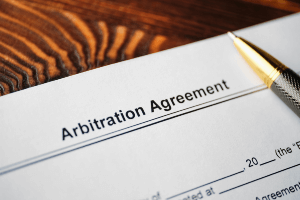Generally, contracts have clauses that grant the right to file an arbitration claim if a dispute arises between two or more parties. If the contract does not have an arbitration clause, the interested party must get the opposing party’s written consent to submit the issue to arbitration.
In this article, you will find out how to file an arbitration claim in Florida.
What is Arbitration? – Explaining the Term
Arbitration is a method of alternative dispute resolution (ADR), which is an alternative to traditional litigation.
In the United States, the Federal Arbitration Act permits – and even encourages- arbitration proceedings in cases involving disputes. At the state level, Chapter 682 of the Florida Statutes provides the state’s Arbitration Code.
Arbitration vs Litigation – Is there an Ideal Option?
Litigation is a lawsuit, which can result in the settlement of a case either by motion or by trial, with or without a jury. In this sense, the US Constitution guarantees the right to trial by jury in many civil cases, at the demand of either party involved in the dispute.
In such cases, if a jury makes a bad decision, the trial court judge must correct the jury’s verdict. This could result in the jury’s verdict being dismissed, reduced, or even increased.
Unlike mediations or negotiations, arbitrations are binding on the parties. In this sense, they can be binding in at least two different manners:
- The arbitrator’s ruling resolves the dispute, even if one or both parties do not agree with it
- An arbitrator’s ruling will likely prevent any meaningful appeal or modification by a trial or appellate court
How to File an Arbitration Claim in Florida – Explaining the Process
Setting the Initial Stage
When a dispute arises in a contract, any of the parties involved have the right to file an arbitration claim.
In Florida, the parties involved in a given dispute can voluntarily agree to participate in arbitration, even if there is no specific arbitration clause in the agreement that legally requires the use of arbitration.
Accordingly, it is possible to initiate the process either voluntarily or through contractual obligation. Once there is an initial setup in place, the parties involved in the dispute need to agree on certain aspects of the soon-to-be procedure.
For instance, the parties may choose to utilize either a single neutral arbitrator or a tribunal of arbitrators.
Also, they can choose to adhere to the standard rules of procedure provided by the American Arbitration Association, or they opt for customizing the procedure and rules to suit their circumstances.
Selecting the Ideal Arbitrator
Then, once the parties have agreed upon all procedural elements, it is time to proceed with the case and select the arbitrator.
Generally, the best approach is to select a neutral arbitrator who is knowledgeable about the subject at hand in the dispute. In Florida, you usually select arbitrators from a pre-approved list of neutral candidates.
After selecting a candidate, you can proceed to hold a preliminary hearing to finalize the procedural elements of the case, as well as define other factors involved in the hearing (e.g., witnesses, evidence, etc.).
Also, it is worth noting that there may be a discovery period before the hearing, which will require all the parties involved in the dispute to share information with opposing parties.
At this phase, the best approach is to work with an expert attorney to understand all the details involved in the arbitrator selection.
Proceeding with the Hearing
After arbitrator selection, it is time to sit down with the involved parties and hear what everyone has to say. Fortunately, arbitration hearings are much less formal than trials at the court. Plus, the location and scheduling of arbitration hearings tend to be more flexible.
During the hearings, each party is allowed to present their case to the arbitrator(s). Upon the parties’ agreement, it is possible to invite witnesses to provide testimony and provide evidence they may have.
Once the hearing process is complete, the arbitrator(s) will assess the case in retirement to deliberate a decision.
Arbitration Award
Ultimately, the arbitrator(s) will issue a decision and determine an award. In a process of arbitration, the decision is considered binding with very limited recourse for any sort of appeal.
Accordingly, the law requires all parties involved to adhere to the terms of the arbitrators’ decision. In Florida, courts recognize a presumption of enforcement of arbitration, but they can review some cases to ensure there was no fraud or misconduct throughout the process.
Do You Need to File an Arbitration Claim in Florida? – We Can Help
At Jurado and Farshchian, P.L. we have expert attorneys to guide you during the process of solving a dispute through arbitration. Call Attorney Romy B. Jurado at (305) 921-0976 or send us an email at [email protected] to schedule a consultation.





